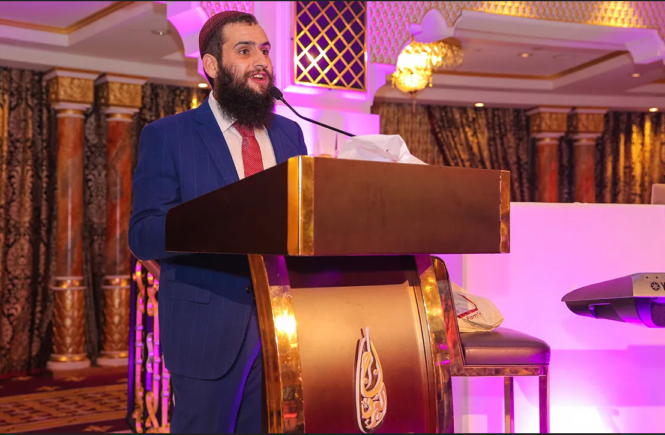The menu at Armani Kaf, an eatery at an inn in downtown Dubai, includes a “glatt legitimate” steak. Indeed, numerous lodgings in Dubai currently work legitimate kitchens. Imports of fit wine to the United Arab Emirates are expanding, also, and there are Jewish petition majorities meeting every day in Abu Dhabi.
Those are only a couple of the indications of a “thriving” of Jewish life in the Gulf country, as per the new Chabad messenger there.
In October, Chabad-Lubavitch declared the arrangement of Rabbi Levi Duchman as the development’s first delegate in the UAE, which has an expected Jewish populace of 2,000 to 3,000. Duchman, who has lived in the UAE for a very long time, talked about his encounters there during a Nov. 8 Zoom function facilitated by a few Northern California Chabad focuses. The discussion, “New Frontiers of Judaism in the Arab World,” additionally remembered his sibling for law, Rabbi Levi Banon, who drives a Chabad place in Morocco.
“[The UAE] is an inviting nation, open nation, lenient nation,” Duchman stated, noticing that the Jewish people group appreciates “solid help” from Sheik Mohammed container Zayed Al Nahyan, the 59-year-old crown sovereign of Abu Dhabi and the UAE’s accepted ruler. “At the point when individuals would inquire as to whether it’s hazardous to stroll in the city, I would let them know in the mid year days, it’s perilous to stroll on the roads just from the warmth,” he kidded.
The UAE and Israel consented to standardize relations in August as a feature of the Abraham Accords, an understanding expedited by the United States that was later joined by Bahrain.
Duchman, who went to the marking function at the White House in September, said he anticipates that more Israeli and Jewish travelers should visit the UAE because of the arrangement and late social changes. (Not exactly seven days back, the UAE government made an unexpected declaration that it would quickly extricate a portion of its severe Islamic laws overseeing individual conduct, for example, the utilization of liquor.)
Rabbi Shmulik Friedman, program chief at Chabad SF’s SoMa Shul, said it used to be “an entire enormous spiel” for one of his strictly attentive family members to lead business in the UAE, and Israeli-visa holders were not allowed to enter the nation. “Presently, the open doors that are opening up are truly astounding,” Friedman told J. after the discussion. “I couldn’t want anything more than to go there sooner or later, with a local gathering, to visit and investigate the nation.”
Concerning Morocco, it was the primary abroad region to which Rabbi Menachem Mendel Schneerson sent shlichim (messengers) in 1950, as per Banon, the Chabad rabbi in Casablanca. “At the point when the wide range of various Jewish foundations were taking a gander at different nations and were disregarding the Arab world, the Rebbe was the simply one to begin sending [emissaries] to Muslim nations,” Banon said.
During the discussion, Banon bragged about the Jewish framework in Casablanca: 20 places of worship, seven legitimate eateries, four Jewish public venues and two Jewish schools. He said Jewish families are moving to Morocco from France to get away from the resurgence of discrimination against Jews there.
“We have couples descending from France who feel that life is such a great amount of more secure in Casablanca than in Paris, as amusing as it might sound,” Banon said.
The child of Moroccan guardians, Banon experienced childhood in Montreal yet has lived for a long time in Casablanca, to a great extent creating programming for nearby Jewish youth. “In a Muslim, underdeveloped nation, there’s a ton of kids that are experiencing childhood in destitution,” he said. “We’re giving them openings, otherworldly and material chances, that they wouldn’t have had, notwithstanding our projects.”
As in the UAE, relations between Morocco’s Jews and the decision specialists are acceptable, Banon said. “It’s entrancing to see the regard and the love that we get from the illustrious family,” he said. (As of late, King Mohammed VI has put intensely in securing the nation’s Jewish history and culture, including by redesigning Jewish places of worship and graveyards.)
Gotten some information about ladies’ privileges in the Arab world, Banon answered, “We truly have something to gain from our Muslim brethren about their humility.”
Both Duchman and Banon communicated confidence about the improvement of Jewish life in their separate nations, and in the Arab world all the more comprehensively.
“You know, we’ve had many years where, with the Muslim people group, things were intense,” Banon said. “Furthermore, presently I think, particularly with the Abraham Accords, as a Jewish people group everywhere, we’re taking a gander at a splendid future.”



